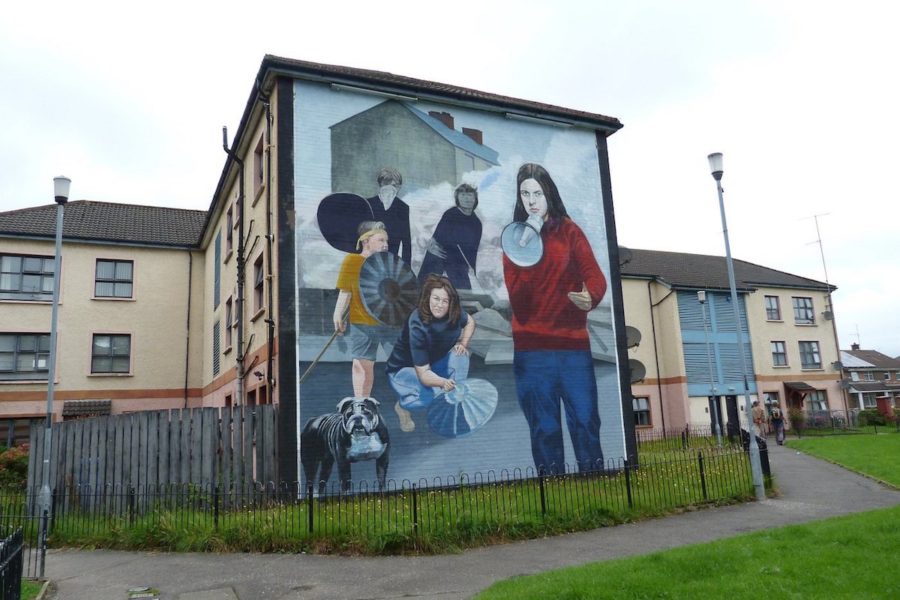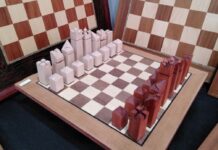Pilar Iglesias Aparicio[1]
Derry was my door to Ireland. I arrived in Derry at the end of August 2002, and stayed there until 19 December, just the first term of the school year, as a teacher of Spanish in an only-girls Catholic school near the Bogside, participating in a teachers’ exchange program between the United Kingdom and the Spanish Departments of Education.

Two planes and some hours at Stansted London Airport, took me from Malaga summer heat to the small town bathed by the river Foyle. I was surprised by the incredible loneliness of the streets on Sunday mornings, the loyalists’ inscriptions, and the terrible memory of a recent past still visible on the high columns that had been vigilance towers used by the British army during the Troubles.
For some weeks in September, it was summer in Derry. Derry’s sky dressed in blue, and the sun shone on the green grass of the common just opposite the house where I lived and offered me wonderful sunsets when I came back home late in the evening and I discovered it, up the hill, when I started to climb up Glen Road.
The heritage of dominion and pain was still present almost everywhere. The first time I went to the Bogside, just one of my first days in Derry, I felt I was in a sacred place and didn’t dare take a photograph of the murals: Bernardette Devlin, whom I had admired so much, calling people to join the demonstrations; the soldiers breaking into the houses… the murals in memory of those who had died in the hunger strikes…
Life at school was not easy. I had already been a teacher for almost twenty years in a High School in a working-class neighbourhood in Málaga. I knew how difficult teenagers may be sometimes (usually reflecting in their transgressive behaviour social unresolved injustices). But, in Derry, I had to deal with some of the more difficult classes and students I had ever met. Of course, once again, like in Spain and anywhere else, those disruptive girls were only acting out the heritage of past violence. I also met good students and very young girls who found it very funny to have a “real” Spanish teacher. I wish all of them the best, after so many years.
Sometimes, after leaving school in the afternoon, I went to Buncrana by bus. I then felt that going to the Republic was like getting fresh air, a break from the tension you still felt in Derry. And some week-ends I travelled to Dublin, a town I soon fell in love with.
I only spent less than four months in Derry, but I lived the town deeply and I still keep its beautiful colors in my memory: September’s blue and green; the yellow and golden colours of the trees in autumn, before Halloween; the dark muddy streets covered in brown leaves in November and the white magic days of December, when everything, even spiders’ webs and the shrubs’ small branches I passed by in my way to the school stayed covered in ice.
I also keep the memory of people’s kindness: the ladies who attended the public library where I went every afternoon to read and to use the internet; the workshops about counselling and feminist literature I shared with women from Derry in the Council Women’s Center; the yoga and meditation workshops I went to, because the town where so much suffering, violence and pain had left their mark, was also a place which looked for healing and recovery; and the friendship and support some teachers offered me while my stay in the school.
And I keep the memory of the Films Festival where I saw The Magdalene Sisters for the first time, without imagining then the place they would have in my life in the future.
I came to Derry for the second time last August, twenty-one years later. A very short visit which allowed me to come back to the Bogside and see St Cecilia’s School building far away up the hill. I could feel that some things are changing for good in my dear Derry: the old soldiers’ towers are already gone; a new bridge over the Foyle has been built, which symbolizes the will to overpass divisions and to promote dialogue and understanding; the Diamond was busy with new shops and restaurants, and the Town Hall offered an exhibition about the Plantation, trying to make past history understood and to help build up a better present.
I love Ireland, I have loved it since I first met her, and I will never forget Derry was my door to this Emerald Island.
- Artículo distribuido por José Antonio Sierra Lumbreras


